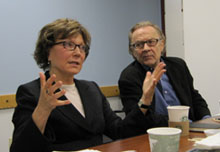
October 17, 2012 – More than any other uprising in the Middle East, the Syrian uprising has made use of social media to shape and influence the narrative on both sides, said Deborah Amos, Middle East correspondent for National Public Radio. In 18 months of covering the Syrian revolution, she said that “young social media activists are playing a major role” in what began as a “nonviolent protest movement” and has “turned into a civil war.”
Syrians rebelling against the regime “have expanded the functions of social media” to the extent that social media has become “more important in Syria than in any other [Middle East] uprising,” Amos said. The activists seized upon social media tools because the international media was banned in the country by the regime. They set out to ” establish a narrative…to portray this revolt as something that was popular, against a brutal dictator, that all Syrians were for it, and they were the vanguard. The goal was to build international support and sympathy,” Amos explained.
The Syrian regime responded to the social media activists by purchasing billions of dollars of software to track social media sites, and partnering with Iranian experts. They developed a “Man in the Middle Operation” that uncovers Facebook passwords and enables the regime to arrest “networks of activists,” said Amos. They are also “not above cruder tactics of torturing people for Facebook passwords,” Amos added, “which happens on a regular basis.”
When asked to comment on how the revolution would end, Amos responded that “this is a decades-long process, and we are just at the beginning.”
Deborah Amos was Goldsmith Fellow at the Shorenstein Center in 2010. Her research paper, Confusion, Contradiction and Irony: The Iraqi Media in 2010, looked at the prosepects of Iraq retaining an open and pluralistic media landscape within the country’s sectarian system.
Article and photos by Janell Sims, Shornestein Center.

